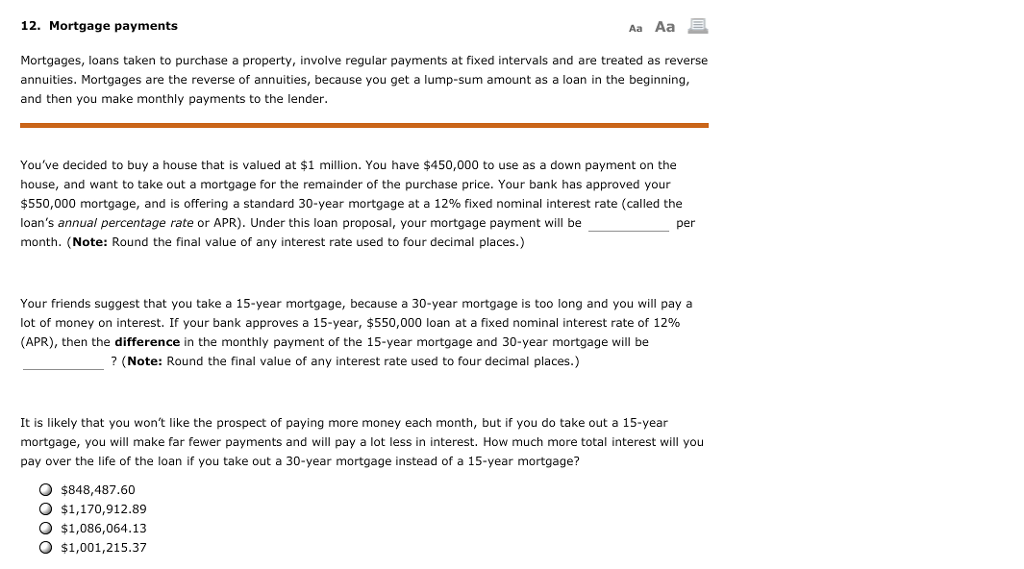Table of ContentsThe How Reverse Mortgages Work StatementsThe Buzz on How Do Lenders Make Money On Reverse MortgagesWhat Is Home Equity Conversion Mortgages - Truths7 Simple Techniques For What Does Mortgages Mean
Now, what I have actually done here is, well, in fact prior to I get to the chart, let me in fact show you how I compute the chart and I do this over the course of thirty years and it passes month. So, so you can imagine that there's in fact 360 rows here on the actual spreadsheet and you'll see that if you go and open it up. what are points in mortgages.
So, on month absolutely no, which I do not show here, you obtained $375,000. Now, throughout that month they're going to charge you 0.46 percent interest, keep in mind that was 5.5 percent divided by 12. 0.46 percent interest on $375,000 is $1,718.75. So, I haven't made any home loan payments yet.
So, now before I pay any of my payments, instead of owing $375,000 at the end of the first month I owe $376,718. Now, I'm a hero, I'm not going to default on my mortgage so I make that very first mortgage payment that we computed, that we determined right over here.
Now, this right here, what I, little asterisk here, this is my equity now. So, keep in mind, I began with $125,000 of equity. After paying one loan balance, after, after my first payment I now have $125,410 in equity. So, my equity has increased by exactly $410. Now, you're probably saying, hey, gee, I made a $2,000 payment, an approximately a $2,000 payment and my equity just increased by $410,000.
So, that very, in the beginning, your payment, your $2,000 payment is primarily interest. Just $410 of it is primary. But as you, and after that you, and after that, so as your loan balance decreases you're going to pay less interest here therefore each of your payments are going to be more weighted towards principal and less weighted towards interest.

This is your new prepayment balance. I pay my home loan again. This is my new loan balance. And notice, currently by month two, $2.00 more went to primary and $2.00 less went to interest. And over the course of 360 months you're visiting that it's a real, large distinction.
What Does Arm Mean In Mortgages - Truths
This is the interest and primary portions of our home mortgage payment. So, this entire height right here, this is, let me scroll down a little bit, this is by month. So, this entire height, if you discover, this is the specific, this is precisely our mortgage payment, this $2,129 (what are subprime mortgages). Now, on that really first month you saw that of my $2,100 only $400 of it, this is the $400, only $400 of it went to actually pay down the principal, the real loan quantity.
Most of it chose the interest of the month. However as I begin paying for the loan, as the loan balance gets smaller sized and smaller sized, each of Click to find out more my payments, there's less interest to pay, let me do a much better color than that. There is less interest, let's state if we go out here, this is month 198, over there, that last month there was less interest so more of my $2,100 actually goes to settle the loan.
Now, the last thing I wish to discuss in this video without making it too long is this idea of a interest tax reduction. So, a great deal of times you'll hear monetary coordinators or realtors inform you, hey, the benefit of buying your house is that it, it's, it has tax benefits, and it does. which fico score is used for mortgages.
Your interest, not your whole payment. Your interest is tax deductible, deductible. And I wish to be extremely clear with what deductible means. So, let's for example, talk about the interest fees. So, this entire time over thirty years I am paying $2,100 a month or $2,129.29 a month. Now, at the beginning a great deal of that is interest.
That $1,700 is tax-deductible. Now, as we go further and even more monthly I get a smaller and smaller sized tax-deductible part of my real home mortgage payment. Out here the tax deduction is in fact extremely little. As I'm getting all set to settle my entire home mortgage and get the title of my house.
This does not suggest, let's state that, let's state in one year, let's state in one year I paid, I do not understand, I'm going to comprise a number, I didn't determine it on the spreadsheet. Let's state in year one, year one, I pay, I pay $10,000 in interest, $10,000 in interest.
Fascination About Which Of The Following Statements Is Not True About Mortgages?
And, but let's say $10,000 went to interest. To say this deductible, and let's state before this, let's state prior to this I was making $100,000. Let's put the loan aside, let's state I was making $100,000 a year and let's state I was paying roughly 35 percent on that $100,000.
Let's state, you know, if I didn't have this mortgage I would pay 35 percent taxes which would have to do with $35,000 in taxes for that year. Simply, this is just a rough estimate. Now, when you say that $10,000 is tax-deductible, the interest is tax-deductible, that does not imply https://gumroad.com/repriavb4o/p/h1-style-clear-both-id-content-section-0-the-single-strategy-to-use-for-who-offers-40-year-mortgages-h1 that I can just take it from the $35,000 that I would have normally owed and just paid $25,000.
So, when I tell the IRS just how much did I make this year, rather of saying, I made $100,000 I say that I made $90,000 since I was able to deduct this, not directly from my taxes, I was able to subtract it from my earnings. So, now if I just made $90,000 and I, and this is I'm doing a gross oversimplification of how taxes actually get calculated.

Let's get the calculator. So, 90 times.35 amounts to $31,500. So, this will amount to $31,500, put a comma here, $31,500. So, off of a $10,000 deduction, $10,000 of deductible interest, I basically saved $3,500. I did not save $10,000. So, another way to believe about it if I paid $10,000 interest, I'm going to, and my tax rate is 35 percent, I'm going to save 35 percent of this in actual taxes.
You're subtracting it from the earnings that you report to the IRS. If there's something that you could really take directly from your taxes, that's called a tax credit. So, if you were, uh, if there was some unique thing that you could actually subtract it straight from your credit, from your taxes, that's a tax credit, tax credit.
Therefore, in this spreadsheet I simply want to show you that I really calculated because month how much of a tax reduction do you get. So, for instance, simply off of the very first month you paid $1,700 in interest of your $2,100 home loan payment. So, 35 percent of that, and I got the 35 percent as one of your presumptions, 35 percent of $1,700 - what are reverse mortgages.
What Are Basis Points In Mortgages for Beginners
So, approximately over the course of the very first year I'm going to save about $7,000 in taxes, so that's nothing, nothing to sneeze at. Anyway, hopefully you discovered this valuable and I encourage you to go to that spreadsheet and, uh, play with the presumptions, only the assumptions in this brown color unless you truly understand what you're finishing with the spreadsheet.